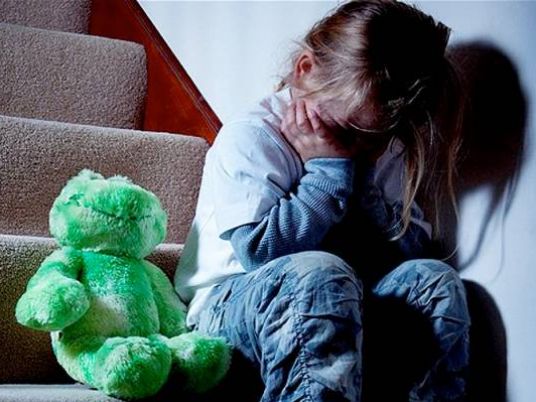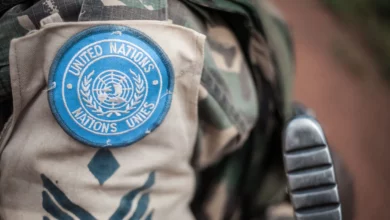
In 6th of October city, specifically at the Green Revolution district, there is a big villa with a big banner of an international kindergarten on the main gate. But if you move around the building, you can see it holds another banner of an orphanage called “Ishraqa”. At first glance you may think the orphanage is a luxurious place where kids can play hide and seek but, in fact, it could be one of the most dismal places you can ever see in your life.
In a space of only two rooms, there are around 16 children stuffed together; and if you come closer, you can feel the fear in their tiny eyes, hear the voice of their stomach growling from hunger, and see signs of brutal torture on their soft skin.
“It all began when we received a complaint saying that kids were being physically assaulted inside an orphanage,” said Azza Abdoun, the manager of the Department of Family and Children at the Ministry of Social Solidarity.
The next day, Abdoun went to the orphanage and as soon as arrived to the place she was panicked as despite the place seemed luxurious but there was lack of security and serenity.
“The kids' eyes were full of fear. I don't know what made them feel reassured enough to talk to me, but then they started telling me about their tragedy. I saw the signs of torture on their bodies, and then suddenly the electricity went off, just when I started hearing the children's cries from their pains, and I was unable to hold back my tears,” she recalled.
“There were tragedies, literally. The children’s hunger cries and whining kept sleep away from my eyes for three days during my stay there,” she said.
Abdoun said that the children did not know the food names in the refrigerator, even when she opened it she found extremely small quantities of food, some of them expired, with the electricity even operating through prepaid smart cards.
Abdoun went to Sheikh Zayed police station and filled a complaint accusing the orphanage manager Amr Zaki of exposing the lives of children to risk, when he burned parts of a child’s sexual organ as a type of punishment.
Moreover, she notified the minister of Social Solidarity, Ghada Wali. The Ministry formed a committee of six members to examine the children's complaints. “We found that the orphanage’s CEO was Atef Ebeid's widow, former Prime Minister during Mubarak’s regime, and that the orphanage was served by four supervisors and one guard, but none of the supervisors ever stayed overnight with the children," said Abdoun.
The ministry decided to expel the CEO — who refused to comment on the incident — and to move the orphanage’s administration and supervision to Dar Al-Orman charity, which hired eight nannies for the orphanage and is now working to get the children back to their schools.
Moreover, the 6th of October prosecussion started its investigation against Zaki, the former manager of the orphanage, as he was accused of assaulting 16 children and exposing their lives to deadly danger.
Speaking to children at the orphanage, Tarek, a 10-year-old kid said that the manager of the orphanage was locking them up inside the rooms after they came back from school until the next morning. Moreover, he explained that, while there were other children in the nursery, the orphans were not allowed to contact or play with them; however, the new nannies promised to let them play every day, hang out and make parties, Tarek added.
Tarek can freely use his bike now, while a few days ago, it was difficult. “My hand is much better now; I don’t want people to see my photo on the television,” he said.

Despite the repeated assaults on Tarek and his colleagues, he insists on his wish to forget everything; “the torture is over and now no one can insult me anymore with 'not knowing who my parent are'; I’m so happy with the orphanage now! I wil not be physically harassed again, and one day I will be a good doctor,” he said.
Meanwhile, Ezzat, an 11- year-old child, is suffering from involuntary urination disease because, every day, he used to be too afraid to go to the bathroom before bedtime. After frequent occurences of involuntary urination, the former manager of the orphanage caused burns to his sexual organ and Ezzat said he was about to die.
Ezzat can live a peaceful life now, along with his friends. He is visiting a physician for treatment. “I am dreaming of becoming a police officer and arresting people who beat kids. I will never forget in my whole life what I have seen here,” he said. “The new people in the orphanage gave me money and candies; and bought us new clothes,” he added.
Meanwhile, Ashraf Abduallah, another child at the orphanage, said that when he was complaining to one of the visitors that he was slapped on his face, the former manager would beat him after they had left.
“The old manager was tying us to bed legs and beating us with a stick and he never stopped until he saw the signs of torture on our bodies. All these memories will be in my mind forever,” Ashraf said.
“He was beating me whenever I opened the refrigerator to bring cheese or a loaf of bread to eat and they were taking our food; but I still love the orphanage, because I don’t know any other place except this one. And now, I can live here in better circumstances than before.”
Khalid Mahmoud, a social service worker at the orphanage, said that he saw what no eye has seen and no ear has heard, as the children saw all kinds of torture. They now suffer from several physiological illnesses because of what they experienced over the past 10 years.
Mahmoud, who started working at the orphanage in January 2017, said the children told him that the former manager used to heat a pocket knife on the fire and then put it on their bodies as a form of punishment. They told him they were banned from playing with the other kindergarten children, who were in the same building but on a separate floor. The kindergarten fees reached LE25,000 monthly per child.
“I noticed that the children have Intermittent Explosive disorder and Attention Deficit disorder, because they rarely can sleep at night, or even during the day; only with great difficulty. Some children even tried to escape or climb over the fences; this behavior was because they felt as if they were in a prison. Some were victims of attempted sexual assaults,” Mahmoud said.
Mahmoud said that the orphanage is not the main interest of the owners, as the former CEO was mainly concerned with business and money, more than with the welfare of the orphans. This, despite the fact that she was receiving donations from international organizations, as she had registered the orphans in international schools. But all this was only on paper, while in reality, the kids were absent all the time and she insisted that some of them must stop going to school altogether.




